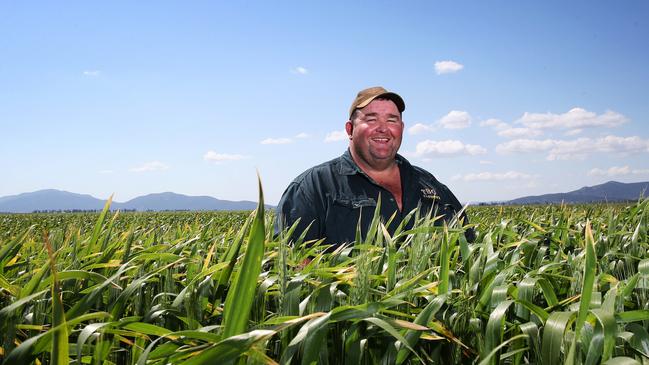Coronavirus NSW: Border closure could put food supplies at risk
Border closures devastating farmers who are struggling to harvest crops will wipe $2.35bn in agriculture from the NSW economy and could disrupt food supplies.
NSW Coronavirus News
Don't miss out on the headlines from NSW Coronavirus News. Followed categories will be added to My News.
- ‘Pretty big ask’: NSW Premier critical of QLD border rule
- Opinion: How Queensland’s border is killing Sydney businesses
Border closures will wipe $2.35 billion in agriculture from the NSW economy and could disrupt food supplies unless all leaders agree to end the “insanity” and allow farm workers to cross state lines.
Friday is D-Day for states to agree to new national definitions of COVID-19 “hot spots” and an agriculture code to guarantee movement across borders, with the federal government vowing to introduce guidelines regardless of premiers’ decisions.

National Cabinet will on Friday be presented with a proposal from the Australian Health Protection Principal Committee defining a hotspot, which can then be used as the medical basis for border movement decisions.
New modelling by the NSW Department of Primary Industries, obtained by The Daily Telegraph, shows that over the coming financial year the nation’s horticulture industry will lose $6.83 billion because of border closures.
MORE NEWS
Elderly home care should be urgently prioritised: Inquiry
Fordham’s radio army save Sydney GP’s career
Man sacked after coughing in Sydney nurse’s face
The direct hit to NSW is $1 billion, but the true cost to the state more than doubles that when the extra cost of maintaining the restrictions is factored in.
NSW has backed the national agriculture code, but farmers now fear an 11th-hour push by other states to allow each jurisdiction to “respond to differing COVID-19 risks” will undermine the whole operation.
The AHPPC on Thursday “noted” the principled code and supported giving the federal government the medical backing to pressure states who do not sign up.
The biggest risk for NSW farmers is Queensland, with Premier Annastacia Palaszczuk expected to produce rival medical evidence if she denies entry to ag workers.
NSW Agriculture Minister Adam Marshall said the entire fate of the industry was on the line. “If other states don’t sign up to the code it will be, in my opinion, an abject failure of leadership,” he said. “I want to see a code that has teeth and compels jurisdictions to remove farcical border restrictions.”
The border measures are strangling the workforce, restricting supply of labour to just 20 per cent of capacity.

Federal Agriculture Minister David Littleproud said the Queensland border restrictions were “abhorrent” and must end.
“As a Queenslander I’m ashamed today when the premier of Queensland can allow 400 AFL executives to swan around a resort in the Gold Coast but won’t allow teenage boarding school children to go home to see their parents in remote NSW,” he said.
National Farmers Federation chief executive Tony Mahar said if governments could not “put politics aside” Australia’s food supply chain would be seriously damaged.
“We do have concerns about disruptions to food supply,” he said. “We’re not talking about an open slather approach here, this is specific measures to keep food and fibre supply chains going.”
Deputy Prime Minister Michael McCormack said city residents would soon feel the impact if farmers were not granted exemptions. “People in cities need people in regional Australia, three times a day, every day — it’s called the food they eat and the drink they drink,” he said.

Gunnedah farm contractor Andrew Thibault said he had pegged all his financial hopes on getting into Queensland to harvest his clients’ crops next month, and he was relying on the mercy of premiers to keep his business alive.
“After three years of drought, we really need this harvest,” he said.
“Our equipment is already over the border waiting but if we can’t get there to do the harvesting we could lose the job.”
HARVESTING HARDSHIP
Albury/Wodonga (NSW/VIC)
Albury is an administrative centre for nearby agricultural communities. The surrounding area has a range of cereal crops, irrigated rice and cotton, fruit, vegetable and livestock grazing.
Moama/Echuca (NSW/VIC)
This region has a diverse mix of rice, cotton, winter cereals, fruit, nuts and vegetables, as well as dryland cropping, and livestock grazing, including for beef, sheep and wool.
Goondiwindi (QLD)
The town produces cotton, wool and crops including grain, oats, barley and chickpeas, and has beef cattle farms.
Boggabilla/Moree/North Star (NSW)
Prime agricultural land for cereal, wheat and barley crops.
Mungindi (QLD & NSW)
The town is a hub for regional cotton, beef cattle and wheat industries.
Stanthorpe (QLD)
Crops grown in this area include vegetables, apples, grapes and stone fruit. Wine production, sheep and cattle grazing is also prevalent.
Tenterfield (NSW)
Main industries are beef cattle breeding and superfine wool production.
Warialda (NSW)
Service centre for the local agriculture sector. Farms in the region produce wheat, sorghum, barley, sheep and beef cattle.
Dareton, Mourquong, Buronga and other NSW towns near Mildura (VIC)
Surrounding areas produce irrigated fruit, grapes, nuts and other crops.
